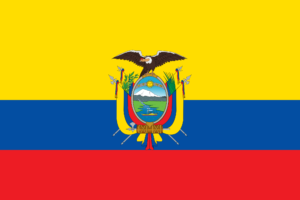
Region: Americas
Disability Definition
In Ecuador, a person with a disability is someone who, as a result of one or more physical, mental, intellectual or sensory deficiencies, independently of the cause that caused it, is permanently restricted its biological, psychological and associative capacity to exercise one or more essential activities of daily life, in a proportion equivalent to thirty percent (30%) of disabilities.
Person with deficiency or disabling condition to one who presents a temporary decrease or suspension of any of their physical, sensory or intellectual capacities, in the terms established by the Law, and who, even when subjected to clinical or surgical treatments, its evolution and prognosis is predictably unfavorable in a period of one year of evolution, without it becoming permanent.
Reference: Disability in Ecuador: Definition, Laws, Employment and Social Status (wecapable.com)
Legislation
The Organic Law on Disabilities (2012) is stated to “ensure the prevention, timely detection, habilitation and rehabilitation of disability and to guarantee the full validity, dissemination and exercise of the rights of persons with disabilities, as established in the Constitution of the Republic, international treaties and instruments.”
Ecuador ratified the UN Convention on the Rights of Persons with Disabilities in April 2008.
Employer Legal Requirements
Starting in 2010, it became compulsory for companies with over 25 employees to fill at least 4% of staff positions with people with disabilities.
Reference: Ecuador – United States Department of State
Accessibility Requirements
According to a 2020 Human Rights report: “Although the law mandates access to buildings and promotes equal access to health, education, social security, employment, transport, and communications for persons with disabilities, the government did not fully enforce it.”
Reference: Ecuador – United States Department of State
Cultural Norms
“Disability in Ecuador is still stigmatized, and persons with disabilities face multiple barriers to their inclusion in society. They often face negative attitudes and discrimination, with many people seeing them as less capable than others. Many people with disabilities struggle to find employment, education, and healthcare. As a result, many are forced to rely on their families or charity for support.
In Ecuador, there is a long-held belief that disability is a punishment for sin. This belief system is prevalent in rural areas, where many people still hold onto traditional beliefs. While it is gradually changing, there is still a lack of awareness and understanding about the causes and nature of disabilities. As a result, persons with disabilities are often discriminated against in many aspects of life.”
Reference: Ecuador – Disability – Expat Focus
Business Practices/Examples
Additional content coming soon.
Insights
There are and estimated 472,213 people with disabilities in Ecuador.
Lenin Moreno, Ecuador’s President until 2021, was the first wheelchair user to become head of a global South state. Moreno has become a symbol and a champion of the tireless battle against the discrimination of those who live with disabilities.
Reference: UNFPA Ecuador | The Potential and Challenges of Ecuador and Lenín Moreno – Wikipedia
Supplier Diversity
Additional content coming soon.Talent Sourcing Resources
The General Ecuadorian Foundation (FGE) is a nongovernmental nongovernmental NGO development cooperation organization, approved by the Ministry of Economic and Social Inclusion, through Agreement No. 294. Since March 1980, it has been working on the disability sector, especially the intellectual one. Our purpose is to achieve the social and labor inclusion of people with disabilities, thus improving their quality of life. The CEE Program Objective is to provide support and advice to companies and entities that have the obligation to comply with the 4% insertion of people with disabilities in their payroll and, in some cases, can not incorporate them into their operating functional scheme.
Additional Resources
Ministry of Economic and Social Inclusion (MIES): Services for people with disabilities.
The Latin American Network of Non-Governmental Organizations of Persons With Disabilities and their Families (RIADIS) is a network formed by organizations of persons with disabilities from 19 countries in Latin America and the Caribbean. Formed in 2002, RIADIS represents national DPOs as well as several NGOs acting as technical collaborators.
